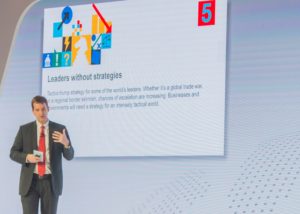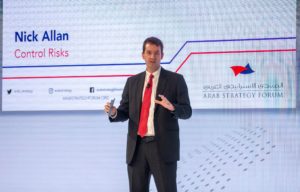ASF 2019: US Campaign Trail, Leaders Lacking Clear Strategies, Vocal Activist Society Pose Major Security Risks In 2020
The 12th edition of the Arab Strategy Forum (ASF 2019) kicked off with the first session entitled ‘Top 5 Risks – 2020’, in which Nick Allan, CEO of Control Risks, explored the global security risks 2020 may bring for public and private sector institutions.
Presenting his risk map for the year ahead that highlighted the five key risks, Allan said: “We live in an era of extraordinary change, and there are existential risks facing us today.”
The first risk is the declining presence of the US on the international scene. As the global order changes, the country is less interested with what is occurring outside its own borders, Allan stated. The economic and political power of the US has become more centralised, making foreign policy more unpredictable. The upcoming domestic election will be driving policy and impacting the balance of the world order as the US has retreated from the world stage.
“How allies and adversaries hedge against the most ideological election in 40 years will heavily influence the geopolitical risk landscape for business in 2020,” he said.
Allan added that the electoral US campaign will focus foreign policy on managing crises, distracting US attention from non-urgent issues and geographies.
“The 2020 electoral campaign will make US foreign policy significantly more unpredictable than we’ve been used to for the past three years,” Allan pointed out.
Meanwhile, the second risk is the emergence of a vocal activist society that is quick to pass judgement. Across the world, social pressures and coordinated activism will demand greater accountability from corporates and governments. He said foreign investment is becoming more attuned to global social values as well as employees’ and communities’ interests, and governments are expected to follow suit. He noted that social media is helping activists organise more quickly and more effectively, testing government surveillance and response.
Cyber warfare poses the third risk expected to hit a new level. Cyber threats will align as never before to attempt a high-impact cyber-enabled assault on critical infrastructure. As connectivity increases exponentially, so does vulnerability to intentional and unintentional attacks in the cyberworld. And the intent of governments and criminals to exploit these vulnerabilities is also on the rise.
The fourth risk is an economic anxiety combined with political fragility. According to forecasts, global economic growth in 2020 will be dismally low. Allan said if global GDP takes a turn for the worse, we cannot expect a fragmented world to craft a coordinated policy response. The cost of inaction will be paid in higher political instability.
Finally, the fifth risk is leaders without strategies. Allan stressed the need of developing strategic responses to critical future issues such as education, political representation and economic diversification, rather than using tactics to resolve short-term matters. Businesses and governments, Allan said, will need a strategy for an intensely tactical world.







